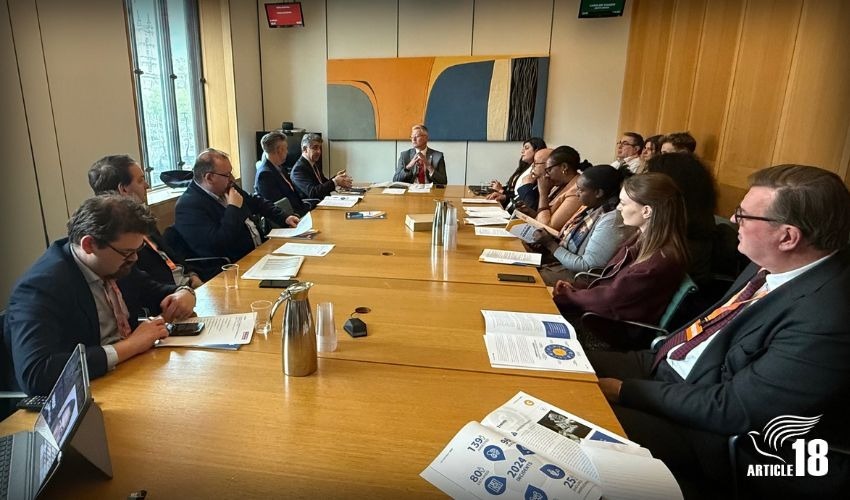
The UK’s Special Envoy on Freedom of Religion or Belief (FoRB), David Smith, has said there are “few countries on Earth that seem less free when it comes to FoRB than Iran”.
Mr Smith was speaking at our third annual report presentation at the UK parliament, held in conjunction with partner organisations and report co-authors Open Doors, CSW, and Middle East Concern at Portcullis House on 23 April.
This year’s event also featured a contribution from the UN’s Special Rapporteur on the Rights to Freedom of Peaceful Assembly and Association, Gina Romero, as well as witness testimony from Iranian Christian convert Saghar Mansouri.
Mr Smith, who chaired the event, highlighted some of the statistics in what he called the “sobering” report, including 139 documented arrests of Christians in 2024, dozens of travel bans, hundreds of thousands of dollars in fines, evidence of torture, and the targeting of Christians’ finances.
He added that he had been personally impacted by the stories of Iranian Christians, having himself helped one Iranian Christian asylum-seeker with his claim. This refugee, who fled Iran after being arrested because of his faith, has now been accepted by the UK, he said, and is “flourishing”.
But Mr Smith said: “As much as it’s wonderful to have fellowship with your co-religionists – in this case, for me, other Christians from around the world – and to learn from them, to engage with them, to share faith … I would much rather that scenario had not emerged, and that person that I’m thinking of was able to stay in the country that he loves, to flourish there as a Christian and to live out his life in peace.”
‘Clear violations of freedom of assembly and association’
In her address, Special Rapporteur Gina Romero said the report showed “clear violations” of Iranian Christians’ rights to freedom of assembly and association, and called on Iran to “adjust its regulations and practices to protect and guarantee these rights, with no discrimination, as well as the rights to freedom of expression, conscience, belief and religion”.
Ms Romero stressed that her mandate includes protection for faith-based groups, which “for sure includes worship services”.
“The interlink between freedom of conscience, religion and belief and the freedom of peaceful assembly and of association are very strong,” she said.
She noted that Article 6 of the Declaration of Elimination of Intolerance based on Religion or Belief protects “the right of freedom of thought, conscience, religion or belief”, including “freedom of worship or assembly in connection with a religion or belief”, and this includes the ability to “establish and maintain places [of worship]” and “access [to] resources, which is part of the freedom of association”, she said.
2/4 Freedom of thought, conscience, religion and belief is intrinsically linked to the rights of assembly and association. These rights must be protected without discrimination, according to international standards.
— Gina Romero (@Ginitastar) April 28, 2025
4/4 We will continue working to ensure that voices like Saghar Mansouri’s are not silenced.
More information: https://t.co/JfHeY8FOoV
#FoRB #HumanRights #Iran— Gina Romero (@Ginitastar) April 28, 2025
“Undue stigmatisation, criminalisation, banning or … restriction to faith-based or religious groups or associations … for the sake of the expression of their faith or belief, or for their participation in peaceful assemblies curtails the rights to freedom of assembly and of association,” said Ms Romero.
These rights are “not absolute”, she clarified, but any restrictions must “follow the principles of legality, which means that they need to be in conformity with the law, but also the human rights international standards, the principle of proportionality and the principle of necessity”.
“The international standards are very clear … that all restrictions need to be carefully assessed”, and “restrictions imposed under the interest of ‘national security’ … need to be necessary to preserve the state’s capacity to protect the existence of the nation, its territorial integrity or its political independence against a credible threat of use of force.”
“All threats need to be clearly proved,” she stressed, and “states have the obligation to ensure that laws, their interpretation and application do not result in discrimination in the enjoyment of the right of peaceful assembly and association, for example on the basis of religion and belief”.
Ms Romero said violations of the rights to freedom of peaceful assembly and association documented in the report included:
- “Christians being summoned to court to face charges of establishing or membership of a group … with vague accusations of ‘disrupting’ the security of the country.”
- “The dismantling of churches … on vague accusations of being ‘illegal’ and removing their leaders.”
- “The arrest for participating in peaceful assemblies, including protests and the celebration of Christmas.”
- “The harassment and persecution of institutions, leaders and organisations for receiving foreign funds for their communities in a strategy of allegedly isolating and financially undermining the Christian community as part of a broader strategy of suppressing its growth and influence.”
- “The demolition of places of worship and/or the confiscation of property.”
- “The vilification of assemblies and associations under stigmatising narratives, including narratives such as ‘anti-regime groups’, ‘member of a sect’, etc.”
- “The criminalisation of assemblies, such as attending house-churches for worship services [and] performing baptisms.”
‘I’ve been living with trauma for nine years’
Our witness testimony this year came from Saghar Mansouri, a 39-year-old Christian convert who fled Iran in 2016 after her home was raided and she and eight others – including her two younger sisters – were arrested.
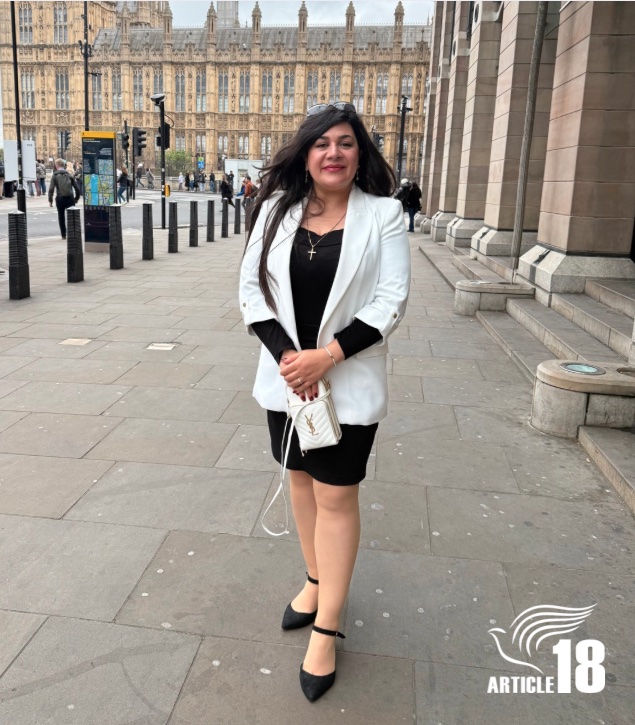
Saghar explained how her church – the Central Assemblies of God Church in Tehran – had been forcibly closed in 2013, after which Christians used to gather at her home because “we had no place to worship” and, as she had studied clinical psychology, “many came to me for help”.
“I visited them at home or welcomed them to mine,” she explained. “We had to worship secretly. We were afraid the neighbours might hear us singing and report us.”
“Even Christian seminars had to be attended outside the country, and our communication was often online and in hiding,” she said.
Recalling the raid on her home, Saghar said the agents “broke the door with a crowbar and entered violently”.
“There were 22 of us inside,” she said. “They took eight of us away, filmed everything, forced women to wear hijab, took our phones, and even watched me in the bathroom.
“I asked for my Bible, but an officer shouted, ‘You don’t need it anymore. You’re going to become a Shia Muslim.’
“They took my Christmas tree and told me: ‘A Christmas tree isn’t a crime by itself. But when it’s found in your home, it becomes part of the evidence. Just like taking a knife from a criminal or a doctor—it depends on the context.’
“They accused us of working for the CIA and Mossad. They told my elderly mother-in-law, ‘We will return your son [who was in the UK] to Iran and make these people Muslim again.’
Iran’s regime is pushing Christians ‘to leave’, according to a woman who fled. @articleeighteen found that jail terms for Christians rose significantly in the last year, and Saghar says Iran is more difficult for Christians than when she fled to the UK🔊: https://t.co/BZHBHRo7gJ
— UCB News (@UCBNewsTeam) May 1, 2025
“They told me that by teaching the Gospel, I was stealing the identity of young people. They said meeting in homes is illegal and called it an ‘underground church.’
“I told them, ‘When you closed our church, we had no choice but to meet at home. This is natural for Christians—just like Muslims gather with their friends or family.’ I asked, ‘Is it also illegal when my grandmother hosts women for Islamic ceremonies?’”
After she left Iran, Saghar explained that all the others who had been arrested in the gathering— including her two sisters — “had to flee through dangerous and illegal routes, without passports”.
“Until today, my family and I continue to suffer deeply,” she said. “The court later sentenced us to five years in prison and two years of travel ban. That means I can never go back home.”
Saghar added: “Today, I am standing here to speak as a voice among millions of others who have suffered under the current regime in Iran. For the past nine years, I’ve been living with the emotional and psychological trauma that this regime caused.
“I go to therapy every week. I still struggle with fear, flashbacks, anxiety, and grief. The skies of this country have witnessed my tears and silent cries.
“Today, I opened my heart to you. I shared my pain, not because it’s easy—but because it matters. Please remember: I am not alone. There are many like me.”
She concluded by asking that in the UK’s “diplomatic contacts with Iran or decisions—decisions or contacts that affect the future of the UK as well as people like me inside Iran—you will remember my story, and the faces of others who cannot be here to speak.”
Mr Smith said Saghar’s story was “very, very powerful and humbling”, and commended her for her courage both in living out her faith in Iran and sharing her testimony, which he said was “something that is very personal to you, but also, as you say, reflects the situation of millions of people who are under the same kind of oppression. So we applaud you for your bravery.”
Leaked judiciary files ‘profoundly significant’
Article18’s director, Mansour Borji, said “the statistics you see in the report should definitely shock us all”.
“One hundred and thirty-nine people known to have been arrested, and this is just the people that have been arrested and detained, but many more are affected – family members, loved ones who remain worried about them; 263 years of prison sentences, six times more than the year before”.
He explained that although Iran’s constitution and commitments under the international covenants it has signed safeguard religious freedom, the reality for Christians and other religious minorities in Iran is “drastically different”.
Mr Borji also highlighted the importance of the leaked Tehran judiciary files in 2024, which he said were “profoundly significant”, as “the Iranian government often dismisses reports of human rights violations as ‘biased’ or ‘fabricated’ [but] these files provide objective evidence that cannot be ignored.”
Mr Borji added that the title of the report, ‘The Tip of the Iceberg’, conveys that the documented violations do not provide the “full reality” for Iran’s Christians, as many more cases go unreported.
‘Without international accountability violations persist unchecked’
Open Doors UK’s Sam Miller concluded the panel by providing further recommendations to the UK government, including for the UK to:
- Speak out publicly against Iran’s FoRB violations, as well as in any engagements with the Iranian authorities.
- Call on Iran to repeal the “vague and overly broad” Articles 500 and 500 bis of the penal code, whose continued use “constitutes a direct violation of the [International Covenant on Civil and Political Rights]”.
- Raise specific cases of Christian prisoners of conscience, such as Joseph and Lida Shahbazian, Mina Khajavi, Hakop Gochumyan, and Nasser Navard Gol-Tapeh, whose photographs were displayed at the meeting.
- Pursue targeted Magnitsky-style sanctions against violators, including “judges who have handed down multiple long-term sentences to Christian converts based on little or no evidence”, and security agents within the Ministry of Intelligence and Islamic Revolutionary Guard Corps who have been “implicated in torture, denial of medical care and forcing detainees to recant their faith”. Such sanctions “show the UK is willing to hold individuals, not just states, accountable for abuse”, he said.
- Challenge countries hosting Iranian refugees, such as Turkey and Georgia, to “upload the principle of non-refoulement and ensure Iranian Christian asylum-seekers are protected and treated in accordance with international refugee law”.
- Create a safe legal route for Christians like Saghar and her sisters – who spent seven years in Turkey before being resettled to Canada – to come to the UK, as recommended in the House of Lords by Bishop Guli Francis-Dehqani.
- Support the mandates of the UN Special Rapporteur and Iran fact-finding mission, “ensuring that FoRB and the persecution Christians are explicitly highlighted”.
“The Special Rapporteur and fact-finding mission serve as vital mechanisms for documenting and exposing FoRB violations in Iran,” Mr Miller said. “This mandate provides a platform to bring international visibility to cases that are otherwise silenced with Iran’s tightly controlled media and judicial system.
“The UK’s support can ensure that the persecution of Christians – particularly converts – is not forgotten in these reports.”
Mr Miller noted that while Iran has ratified key international treaties guaranteeing FoRB, the report “shows how these commitments are not being honoured in reality”.
Arresting Christians on charges of acting against national security “merely for gathering for prayer directly contradicts Article 18 of the ICCPR”, he said. “Without international accountability these violations will persist unchecked, so we have a key role.
“The UK must speak out publicly, as well as in all engagements with Iran against violations in the country. Public advocacy and statements work to challenge the narrative presented by the Iranian regime.”
Mr Miller also noted how, in a parliamentary debate earlier this month, FCDO Minister Stephen Doughty “confirmed that the government remains ‘absolutely committed’ to holding Iran to account for its restrictions on freedom of religion or belief”.
“We welcome this commitment to advocacy, which should be done in conjunction with key allies, such as the EU, US and UN,” Mr Miller said.
Mr Miller added that the stories of Iranian Christians that he had read about became real to him when his sons were baptised in a UK church on the same day as five Iranians who had fled the country on account of their faith.
He said it was “very poignant” to see that “while my boys have been able to grow up in freedom in the UK, having faith, these five young guys having the same faith, but having such a different kind of journey. And it reminded me that when we’re talking about these issues, they’re not just principles; they’re about real people.”
David Smith ended the meeting by commending civil society for its “vitally important” work and encouraging supporters to engage directly with their MPs, who he said are “universally alive to what their constituents ask them”.
Mr Smith concluded: “I was struck by a sentence in the report quoting a retired Iranian judge who had been involved in approving the original penal code and he said, ‘Apostasy was supposed to be included in our criminal code, but it was left out for fear of international pressure.’ International pressure works; that’s the lesson. And that means I have a job to do, you have a job to do, and we can do it together, but let’s continue to do it so that people in Iran can enjoy freedom of religion or belief.”
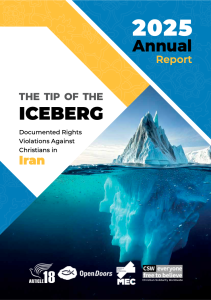
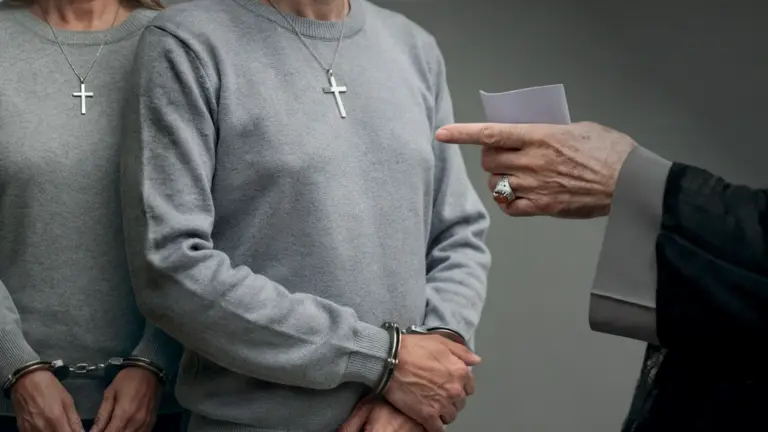
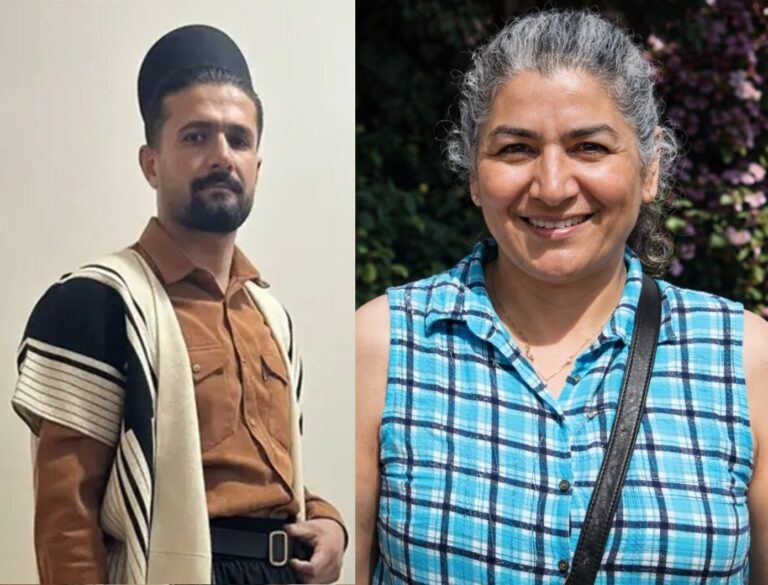
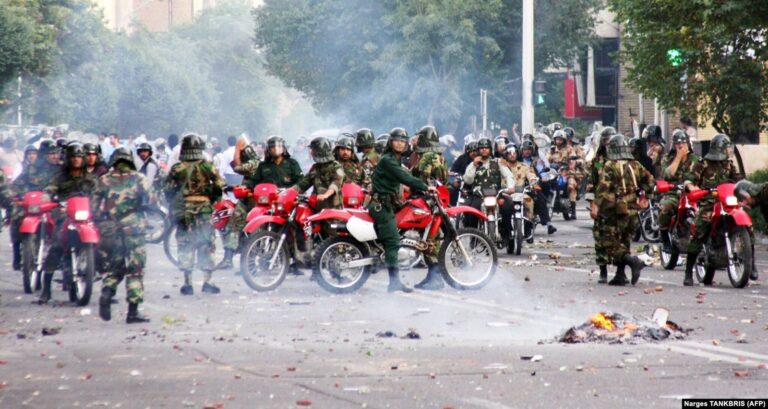
0 Comments